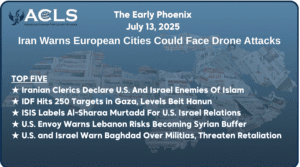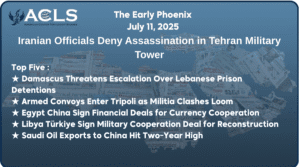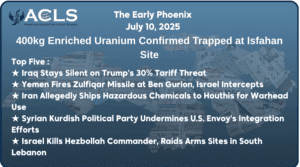Time is Ripe for Snap Back Sanctions on the Iranian Regime, the Weakest Link in the Beijing-Moscow-Tehran Alliance
By Dr. Samir Altaqi
After establishing their quasi-total hegemony over the power centers in Iran, the hardliner leadership of the Iranian Revolutionary Guard is sinking into a multilayered crisis. Facing tremendous hardships, the Iranian people seem far from bending to oppression. The ethnic, gender, and youth crisis fermenting for many decades erupted suddenly, but expectedly, complicated the already explosive situation. The Pasdaran modus operandi is now at an impasse, as the morale of its members is severely affected by the domestic uprising, and the role of Pro-Iranian Militias in destabilizing the nation-states in the region rendered the societies more rebellious. This critical and dangerous situation is raising obvious fears among the highest circles in Iran’s regime. With remarkable clarity, those facts were elicited in the leaked minutes of the gathering between 45 Pasdaran leaders and the Supreme leader Khamenei on January 3rd.
While the Iranian leadership is bonding itself into an irrevocable alliance with Russia’s aggression in Ukraine, the socio-economic crisis is getting rife. In theory, Iran may be perceived as a strategic pearl of the crown in a region fraught with ideological and ethnic tensions and replete with postcolonial complexities. The realities show that Russia and China are profiting from Iran’s behavior, penetrating the Levant region through the cracks of the IRGC’s destabilization activities. Syria was a stark example where the Iranian role allowed Russia to impose itself as a dominant power broker needed to balance the critical contradictions among Israel, Turkey, Iran, the Syrian regime, Egypt, and the Gulf Arab states.
For its part, China continues to take advantage of such a role in the Levant after its successful proven track record in the Gulf. The Chinese Ambassador, Shi Hongwei, announced during his visit to the Assad government prime minister Hussein Arnous, that his country is following with interest developments in the situation in Syria and that China will contribute to the rehabilitation of infrastructure affected in the February earthquake, contradicting the United States and Europe in their aid policy for Syria.
After Russia and China, Iran remains the weakest link in this tripartite alliance. Regardless of its so-called new reconciliations with the Gulf, the IRGC-led government will soon maneuver its actions to achieve its historically sought-after expansion ideology. While the current situation may falsely forecast calm in the region, there is nothing to say that Iran is not planning a big storm to regain superiority. Everything will depend on the results of the Russian war on Ukraine, and the world must take heed of the fact that Iran continues to prepare for all possible scenarios actively.
A good course of action would be for the United States to increase Iran’s isolation on all levels. A nation whose malicious leadership is heading towards a downfall by its own citizens can no longer be sustainable. Empowering the current Iranian uprising is the policy that would have the best chance of paving the way for Iran’s transition into a state that would behave in accordance with global security standards. Iran’s future should ensure a constructive role in shaping a stable and peaceful Middle East. Such a shift is not a dream and would significantly serve the interests of the United States.
Fostering this scenario requires the U.S. administration to do much more to intensify pressure on the Iranian regime, which is going through one of its weakest moments. The correct policy steps are clear: it is long past the hour for Washington to give its full support to the Iranian people’s uprising, to launch the legal process at the UN Security Council to implement the “snap back” of international sanctions on the regime, and to actually enforce the US sanctions that exist in a way the US administration has purposely not done for the past two years. Only such a policy will deter Russia and China from investing in turning the Middle East into a black hole that could distract the efforts of Western countries and threaten U.S. interests and allies in the region.
March 23, 2023



